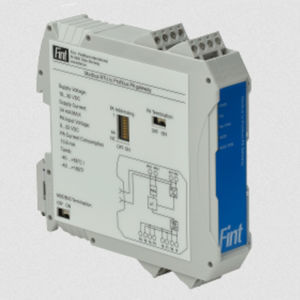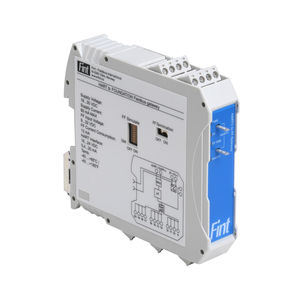
- Robotics - Automation - Industrial IT
- Automation
- Modbus RTU converter
- Fieldbus International as
Modbus RTU converter T610built-inCMOSgalvanic
Add to favorites
Compare this product
Characteristics
- Bus
- Modbus RTU
- Other characteristics
- galvanic, built-in, CMOS
Description
The T610 is a built-in module for interfacing Modbus RTU transmitters to a FOUNDATION fieldbus network(FF).
T610 includes a Modbus master in order to communicate with a Modbus instrument. The module reads the variables from the instrument and converts this to a dynamic variable on FF. Four AI Function Blocks are supported. The location of the Modbus registers and data type of the Modbus variable can be configured from any FF configurator. The T610 is tested against ITK 5.2.0 Other Function blocks can be added on request. The device has LAS (Master functionality).
Applications
The T610 is intended for Modbus RTU instruments that shall be upgraded to interface to FOUNDATION fieldbus
The following power options are available for powering and galvanic isolation:
The T610 comes with Galvanic isolation for instruments that are separately powered
Power supply for the instrument (3.3Vdc).
Option 2 is only possible for low power consuming devices. The electrical interface should be CMOS.
The following physical interfaces are supported:
CMOS UART
RS 232
RS 485
FF functionality supported:
Alarms
Low pass filtering
Unit conversion
Range
User calibration
Diagnostic information
Before starting to use the T610, it is recommended to purchase the Starter kit, ST61. It contains all the necessary tools for configuration and evaluation of the FF technology.
Mechanical description:
Round card – 65 mm in diamter
Operation Temperature Range:
-40 °C – +85 °C
Electrical Specification:
Curent draw 20 mA
Other Fieldbus International as products
FF, Foundation Fieldbus
Related Searches
- Communication gateway
- FOUNDATION Fieldbus gateway
- Serial gateway
- DIN rail mounted converter
- DIN rail gateway
- Serial converter
- Modbus gateway
- RS-485 gateway
- RS-485 converter
- RS232 converter
- Modbus RTU gateway
- Protocol converter
- Power IC converter
- Digital IC converter
- Communications converter
- Modbus converter
- Modbus RTU converter
- Slave gateway
- Galvanic converter
- Modbus TCP converter
*Prices are pre-tax. They exclude delivery charges and customs duties and do not include additional charges for installation or activation options. Prices are indicative only and may vary by country, with changes to the cost of raw materials and exchange rates.





